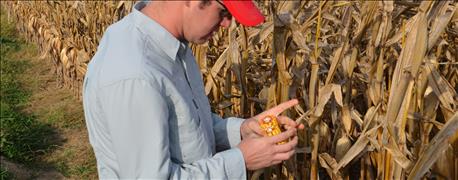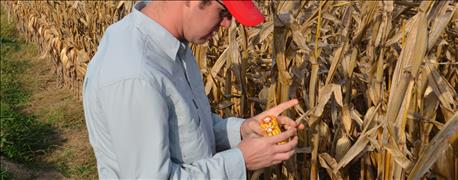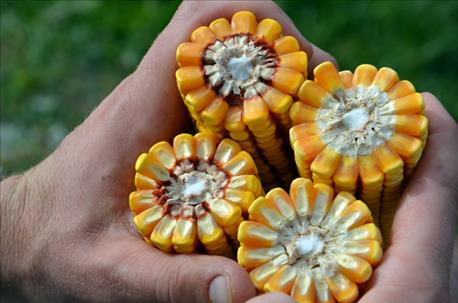
Do corncobs add money to your bottom line? Unless you’re a livestock producer who obtains crushed cobs for bedding, the answer is a resounding “no.” So why would you care about cob color?
Daniel Bechman, product specialist for Beck’s, says there’s no factual reason to explain why most farmers should care about cob color. Yet when he speaks to farmers and mentions that a hybrid has a white cob, some eyebrows go up. That response is based on history, not fact, he says.
Here is his explanation about why some people think cob color matters, even though there’s no connection to cob color and yield today.
IPF: What cob colors are common in the industry today?

JUST ANOTHER TRAIT: Daniel Bechman says cob color is just another genetic trait, and it isn’t linked to yield or any other important performance parameter.
Bechman: Most people are used to seeing red cobs. However, some hybrids today have white cobs. One of the best performers in our lineup currently has a white cob. Still other hybrids have pink cobs.
IPF: Why does cob color vary?
Bechman: It’s strictly a matter of genetic inheritance. Cob color is a trait that is inherited, like hair color in people. It depends on the color of the cob in the two inbred parents used to produce the hybrid. If both inbred parents have white cobs, the hybrid will also have a white cob.
IPF: Why do some hybrids have a pink cob, rather than a deep red or white cob?
Bechman: That happens in some situations where plant breeders cross an inbred that happens to have a red cob with an inbred that has a white cob.
IPF: Is there any correlation between cob color and yield, disease resistance, or other performance factors?

COLOR CONUNDRUM: Some farmers still hesitate to purchase a hybrid with a white cob. It’s a knee-jerk reaction related to history and not present-day fact, agronomists say.
Bechman: No. Cob color by itself doesn’t affect yield, disease resistance or anything else. It’s simply a trait that comes from inbred parent lines. If an inbred line has a white cob, it was selected because it was superior in yield or other agronomic characteristics. Selection had nothing to do with cob color. A white cob happened to come along with the other traits.
IPF: Why do some farmers still balk when they hear a hybrid has a white cob?
Bechman: It goes back to history. Many years ago there were some very popular hybrids on the market that ran into problems with disease susceptibility and standability. They happened to have white cobs. Farmers assumed there was a connection, and that any hybrid with a white cob would have those issues.
IPF: Is there a connection?
Bechman: No. The inbreds behind those genetics at the time happened to have a white cob. Susceptibility to disease or stalk quality issues had nothing to do with cob color. Those genetics are by and large no longer in the industry. That past history shouldn’t prevent you from considering a white cob hybrid today.
Daniel Bechman is the son of this reporter, Indiana Prairie Farmer Editor Tom Bechman.
About the Author(s)
You May Also Like




